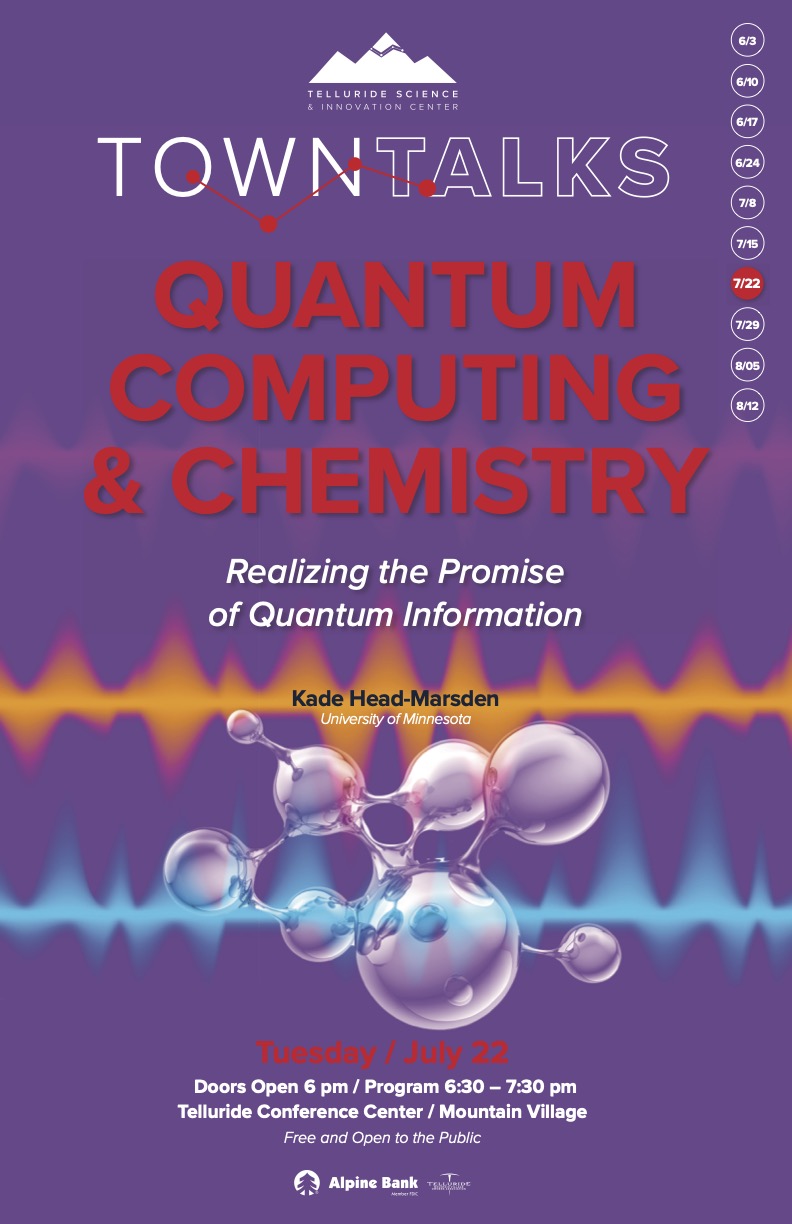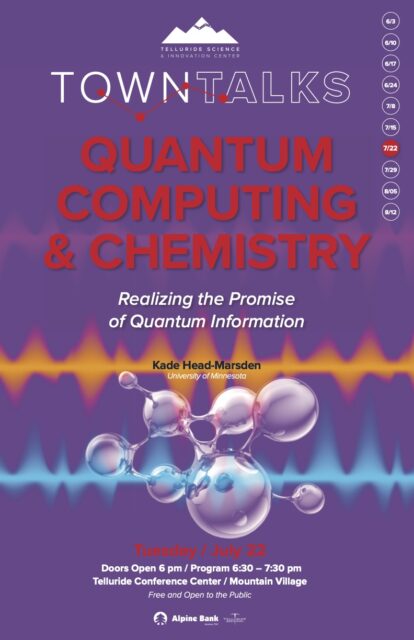
16 Jul Telluride Science Town Talk: “Quantum Computing & Chemistry,” 7/22!
This coming week the 2025 Telluride Science Town Talks series continues with “Quantum computing and chemistry: Realizing the promise of quantum information.” The event features Dr. Kade Head-Marsden and takes place Tuesday, July 22. Doors 6 p.m.; talk, 6:30 p.m..
Town Talks are FREE and open to the public.
Visit telluridescience.org to learn more about Telluride Science and the capital campaign to transform the historic Telluride Depot into the Telluride Science & Innovation Center. The venue is the permanent home for Telluride Science and a global hub of inspired knowledge exchange and development where great minds get to solve great challenges.
The 2025 Telluride Science Town Talks series is presented by Alpine Bank with additional support from the Telluride Mountain Village Owner’s Association.
Go here for more about Telluride Science.
Go here for more on Town Talks.

The development of electronic – or what we think of as now – as classical computers in the mid-20th century revolutionized computer power and speed.
Further evolution in the tech sector has been driven by efforts to make computers smaller, faster, even more powerful, and increasingly integrated into daily life.
Classical computers, mighty as they are, quickly run into limitations when trying to simulate, for example, the behavior of molecules in chemical reactions. The complexity of quantum interactions between atoms grows so fast that current machines simply can’t keep up.
Quantum computing promises to break through that barrier. By harnessing the strange rules of quantum mechanics, quantum computers can simulate molecular processes that are far beyond the reach of traditional computation.
That fact alone makes quantum computing especially valuable for challenges such as:
• Drug discovery, which aims to predict how molecules will interact inside the body;
• Development of new catalysts for chemical processes such as nitrogen fixation in fertilizer production;
• Energy transfer, such as understanding how plants and bacteria transport energy so efficiently could inspire new materials for solar energy and storage.
Each of the above rely on quantum effects that are incredibly difficult to model with classical tools.
But even quantum computing has its limitations – in particular what researchers in the field call “noise.” This interference, in form of heat, light and electromagnetic disturbances, can corrupt quantum information and limit the size and complexity of calculations that today’s quantum devices can handle.
Kade Head-Marsden, a researcher working at the intersection of chemistry and quantum information science, is tackling that obstacle.
Head-Marsden and her team focus on understanding how quantum systems behave in noisy environments, with the goal of designing enhanced systems that are more stable, adaptable, and useful— even with the imperfections of current hardware.
In her Town Talk, “Quantum computing and chemistry: Realizing the promise of quantum information,” Head-Marsden plans to offer a glimpse into the dynamic field of quantum information science. She will explore how the limitations of current quantum hardware mark the beginning of new studies in both chemistry and physics and how scientists are rethinking what’s possible when quantum systems are fully understood
This rethinking about how enhanced quantum systems can be used has clear implications for chemistry. The same quantum effects that make qubits – or basic unit of quantum information – so powerful are also responsible for many of the subtleties in chemical reactions, such as how energy moves through molecules or the way electrons behave in catalytic processes. Traditional computers often struggle to simulate those behaviors with accuracy, especially in large or complex systems. But quantum-inspired approaches are beginning to offer new tools for chemical discovery, even before fully functioning quantum computers arrive on the scene.
Head-Marsden and her team of researchers are helping shape this emerging field by focusing on what is possible now. Their work supports the development of hybrid computing strategies that combine classical and quantum techniques, allowing scientists to make use of today’s imperfect quantum hardware in creative and meaningful new ways. They are also exploring whether the molecules themselves – like those in biological systems – can be used as part of future quantum devices.
As Telluride Science continues to underline its mission to make leading-edge science accessible to the public, Head-Marsden conversation should highlight how even the noisiest challenges can lead to some of the clearest insights.
Dr. Kade Head-Marsden, more:

Dr. Head-Marsden is an Assistant Professor in the Department of Chemistry at the University of Minnesota.
She holds a BSc in Mathematics and Chemistry from McGill University, a Ph.D in Chemistry from the University of Chicago and a Postdoctorate from Harvard.
Prior to joining the team in Minnesota, Head-Marsden was an assistant chemistry professor at Washington University in St. Louis.
The Head-Marsden Group aims to elucidate electronic structure properties and open quantum system dynamics relevant in emerging quantum materials and technologies. Her team’s goal is to make predictions for correlated molecular systems undergoing complex environmental interactions with applications in chemistry, physics, and materials science.


Sorry, the comment form is closed at this time.